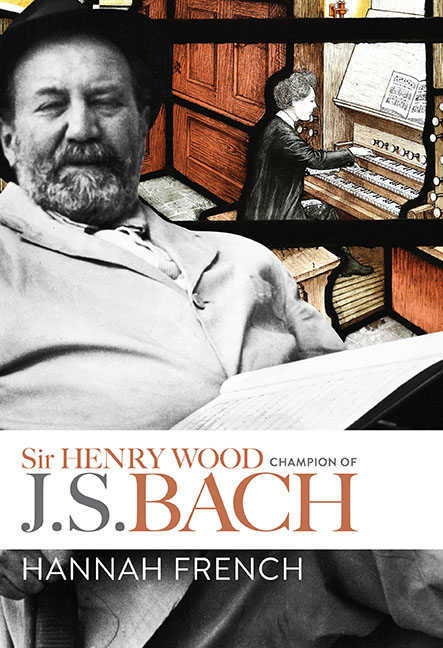Book contents
- Frontmatter
- Dedication
- Contents
- List of Illustrations
- List of Music Examples
- List of Tables
- Prologue
- Acknowledgements
- List of Abbreviations
- PART I CONTEXTUALISING
- PART II PROGRAMMING
- 2 Wood's Encounter with Bach
- 3 Orchestral Bach at the Proms
- 4 Wood's Bach Players
- PART III INTERPRETING: ORCHESTRAL WORKS
- PART IV INTERPRETING: VOCAL WORKS
- PART V INFLUENCING
- APPENDICES
- Bibliography
- General Index
- Index of Works by J.S. Bach
3 - Orchestral Bach at the Proms
from PART II - PROGRAMMING
Published online by Cambridge University Press: 07 September 2019
- Frontmatter
- Dedication
- Contents
- List of Illustrations
- List of Music Examples
- List of Tables
- Prologue
- Acknowledgements
- List of Abbreviations
- PART I CONTEXTUALISING
- PART II PROGRAMMING
- 2 Wood's Encounter with Bach
- 3 Orchestral Bach at the Proms
- 4 Wood's Bach Players
- PART III INTERPRETING: ORCHESTRAL WORKS
- PART IV INTERPRETING: VOCAL WORKS
- PART V INFLUENCING
- APPENDICES
- Bibliography
- General Index
- Index of Works by J.S. Bach
Summary
Bach's achievements are often supremely delightful … but they are not of any great historical importance.
(Hubert Parry, The Evolution of the Art of Music, 1893)THE story of Bach at the Proms begins with their first patron Dr George Cathcart. When Henry Wood had accepted Robert Newman's offer to conduct the festival, he had not been able to contribute the required £2,000 to launch the first season. The answer was found in Cathcart, a wealthy, music-loving, Harley Street ear, nose, and throat surgeon whose patients included singers with vocal complaints, which is how he first came in contact with Wood. The two men developed a friendship, and Cathcart set specific conditions in return for his sponsorship. He insisted that Wood should be the sole conductor, and that the series should be performed at the lower French concert pitch (a′ = 439 at 68°F). Cathcart had previously worked with Wood on restoring the vocal health of singers and believed that the lower pitch would be medically advantageous. His stipulations led to a re-tuning of the Queen's Hall organ and the acquisition of new wind and brass instruments for the newly established QHO, in a rare example of orchestral standardisation. Cathcart's terms prompted a consistency of orchestral sound, especially in the wind section, but specifically for performances of Bach they also helped address the challenges of orchestral balance and moved the pitch closer to eighteenth-century norms.
To jump to the end of the story, in 1944 a tribute to Wood's Proms Jubilee was published entitled Sir Henry Wood: Fifty Years of the Proms. Its contributors included eminent musicians, artists, and commentators of the day, and it gave an account of the differing facets of his accomplishments at the Proms. The chapter ‘Queen's Hall was my Club’ by the philosopher Cyril Joad encapsulates the welcoming environment that Wood and Newman created for a fresh generation of concert-goers:
Sir Henry was the first to make concert-going fashionable, fashionable that is to say among a musically disinherited class, the class of clerks and students, so that to go to the Proms became, for many of us, ‘the thing to do’. Hitherto, concerts had for the many worn a somewhat formidable air. They were expensive, formal and stiff. What Sir Henry did was to take the starch out of concert-going, substituting a physical for a social ordeal.
- Type
- Chapter
- Information
- Sir Henry Wood: Champion of J. S. Bach , pp. 37 - 56Publisher: Boydell & BrewerPrint publication year: 2019



